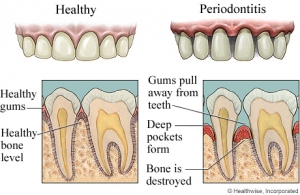Search for topics or resources
Enter your search below and hit enter or click the search icon.
March 8th, 2011
2 min read

As we celebrate International Women’s Day, we are going to highlight dental issues that affect women. As a woman, you go through several different hormonal stages throughout your life, and the changes affect your oral health, making you more susceptible to gingivitis. There are five stages that can have a monumental effect on your dental health: puberty, menstruation, pregnancy, the effect of oral contraceptives, and menopause. Let us look at each one of these closely.
Puberty: During this period of maturing, women produce estrogen and progesterone, which are sex hormones. They increase the blood flow to the gums, changing the way the gum tissue reacts to germs caused by bacterial plaque. The irritation cause by plaque causes the gum tissue to become red, tender, swollen, making it more likely to bleed during brushing and flossing.
Menstruation: During the menstrual period, a woman’s progesterone increases. Some will experience oral changes, including bright red swollen gums, swollen salivary glands, development of canker sores, or bleeding gums. Some might even experience menstruation gingivitis, which usually occurs a day or two before your period, but clears up shortly after the period has started.
 Pregnancy: During pregnancy, a woman’s hormone levels change considerably. Some women experience dry mouth while pregnant. Frequent sips of water and chewing on sugarless gum or candy can help alleviate this symptom. If you are pregnant, you are more likely to develop a condition known as pregnancy gingivitis because of the increased progesterone levels. It is pertinent that you speak to your dentist and make sure that you get frequent check-ups, especially since your health might affect that of the baby’s too. For example, some germs can be passed to your child that would cause tooth decay.
Pregnancy: During pregnancy, a woman’s hormone levels change considerably. Some women experience dry mouth while pregnant. Frequent sips of water and chewing on sugarless gum or candy can help alleviate this symptom. If you are pregnant, you are more likely to develop a condition known as pregnancy gingivitis because of the increased progesterone levels. It is pertinent that you speak to your dentist and make sure that you get frequent check-ups, especially since your health might affect that of the baby’s too. For example, some germs can be passed to your child that would cause tooth decay.
Oral Contraceptives. Some oral contraceptives mimic the effects of pregnancy, which results to women experiencing gum tissue problems that have been discussed above. However, women who take birth control pills will have problems with post-surgery healing after having a tooth extraction. The increased level of progesterone produced by some of the pills cause the body, to experience inflamed gum tissues due to the body’s exaggerated reaction to the toxins produced from plaque.
Menopause: As a consequence of advancing age, compounded by medications taken to combat different diseases, women can be susceptible to different oral problems.  These include burning sensations in the mouth, greater sensitivity to hot and cold foods and beverages, and an altered sense of taste. There will also be a decrease in salivary flow. This results in dry mouth, which might cause the development of tooth decay and gum disease. Menopause also causes the decline of estrogen which in turn puts women at greater risk for loss of bone density, leading to tooth loss.
These include burning sensations in the mouth, greater sensitivity to hot and cold foods and beverages, and an altered sense of taste. There will also be a decrease in salivary flow. This results in dry mouth, which might cause the development of tooth decay and gum disease. Menopause also causes the decline of estrogen which in turn puts women at greater risk for loss of bone density, leading to tooth loss.
Women can avoid, or deal effectively with, these conditions associated with hormone fluctuations by diligently maintaining good daily oral care habits. Professional cleanings are necessary every six months, and during pregnancy, on a more frequent basis.. Tell your dentist if you are taking any medications and oral contraceptives. Finally, a good diet is necessary to keep not only your teeth healthy, but your entire body as well.
Topics: